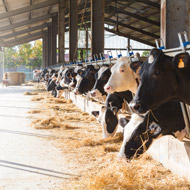Farmers urged to plan ahead to protect animal welfare

Farmers in Northern Ireland are being urged to assess their feed stores.
Farmers in Northern Ireland are being urged to plan ahead to protect animal welfare following a poor harvest.
Waterlogged fields have forced many farmers to keep cattle indoors through the worst of the summer weather. Grass intended for silage could not be cut across much of the country, meaning more conserved feed than normal has been used up for the time of year.
To help minimise livestock feeding issues over the coming months, NI’s Department of Agriculture, Environment and Rural Affairs (DAERA) has called on farmers to assess their feed stores and ensure they have enough food to last until spring.
The department stressed the importance of assessing both the quantity and quality of the feed available to prevent later problems linked to poor diet.
Chief veterinary officer Robert Huey said: “It’s very important that farmers plan ahead in a year like this. Taking hard decisions to remove less productive stock early in the winter will help conserve fodder, improve the efficiency of the farm business and ensure that good standards of animal welfare are maintained.
“The wet conditions will also have increased the risk, for example, of liver fluke, clostridial disease, pneumonia, lameness and general ill-thrift. Preventative measures can decrease these risks.”
He continued: “If your livestock have specific veterinary issues or you see signs that animal health problems are emerging then contact your Private Veterinary Practitioner (PVP) as early as possible.
“Your PVP will provide advice to help you to protect your stock from malnutrition and distress. They will be able, for example, to carry out pregnancy testing of animals which will help in determining their individual nutritional needs or inform a decision to sell them."



 The RCVS has announced a new version of its 1CPD mobile app, with enhanced features for veterinary surgeons and veterinary nurses to record their continuing professional development.
The RCVS has announced a new version of its 1CPD mobile app, with enhanced features for veterinary surgeons and veterinary nurses to record their continuing professional development.